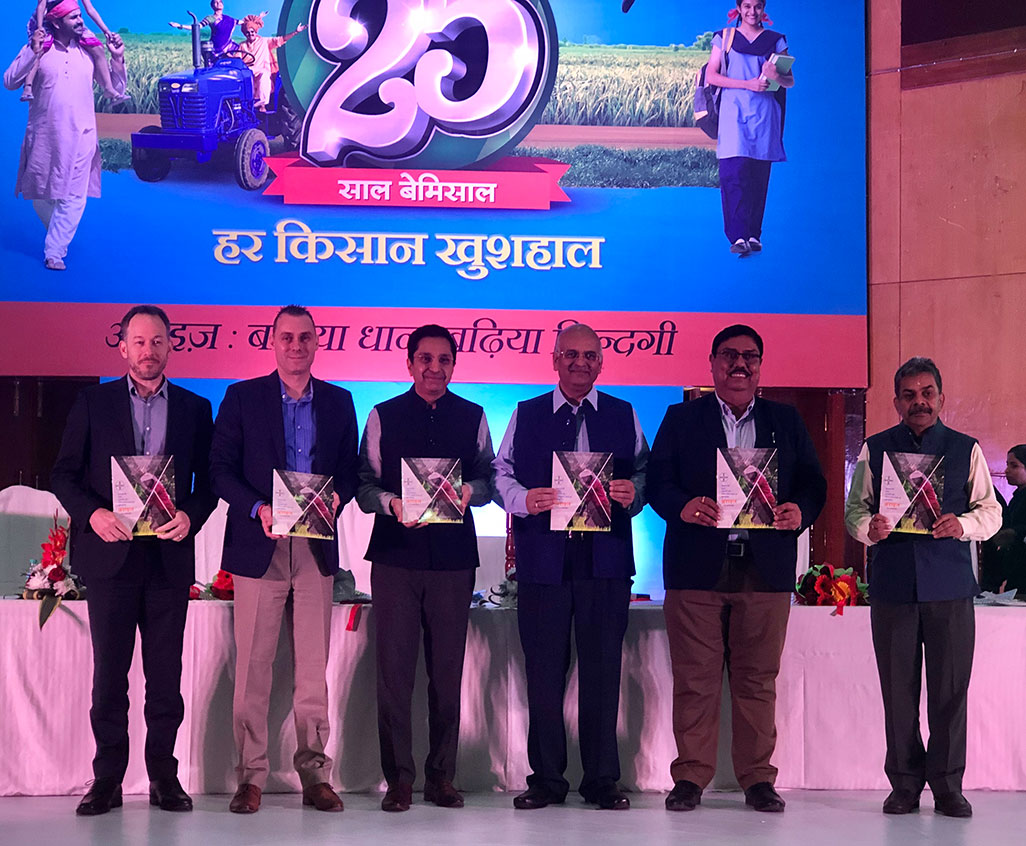25 Years of ‘Better Rice, Better Life’ with Arize

Lucknow, December 5, 2019: Bayer introduced hybrid rice in India in 1995, under the brand name ‘Arize’, to help smallholder rice farmers enhance their productivity and income. Today, Arize is Bayer’s leading hybrid rice seed brand in India with more than 2.6 million acres under cultivation. In line with the Arize ‘Better Rice, Better Life’ brand mission, Bayer also supports farmers to provide better education to their children through its ‘A for Arize’ initiative.
In 2019, Arize completed 25 successful years of partnering with India’s rice farmers. To mark the occasion, Bayer released an impact assessment report today in Lucknow, in presence of farmers, government officials and partners from the rice value chain. The report demonstrates how Arize has helped rice farmers increase their resilience through higher farm incomes and adoption of sustainable rice farming. Stakeholders attending the event applauded Bayer’s efforts in spreading hybridization and creating value for Indian farmers.
Key Arize farmers were felicitated at the event for their contribution to the brand’s journey in India and their openness to embrace hybrid technology. In addition, 25 ‘A for Arize’ annual scholarships were handed out to farmer’s children to enable them to pursue higher education. The scholarship amount includes Rs.20,000 for secondary education, Rs.50,000 for senior secondary education and Rs.1,20,000 for professional courses.
Addressing farmers and stakeholders at the event, D.Narain, Managing Director, Bayer CropScience Limited, said, “Bayer has been working with smallholder farmers for many years with successful programs such as Food Chain Partnerships, Better Life Farming projects, capacity building programs and numerous Public Private Partnerships. In the Indian hybrid rice category, we are adding value to smallholders through Arize. Our aim is to enhance their resilience through higher productivity and income and help them shift from subsistence farming to sustainable commercial farming.”
“With ‘A for Arize’, we want to provide better education to children from India’s resource-poor rural farming communities. This will help promote inclusive and quality education and create a better life for our future generations,” added D.Narain.
Key findings from the Arize impact assessment report
An impact assessment report released by Bayer demonstrates several instances from the past 25 years, where Arize has improved the lives of millions of farmers and their families. Of the 2.6 million Arize farmers across 17 Indian states, many have turned their farms into successful commercial ventures. The key impact points captured in the report include:
-
Improved Incomes: An average Arize farmer reaps a yield advantage of 20 to 35% of rice. Short crop duration of some Arize varieties allow farmers to multicrop with vegetables and other crops, which add to their income and helps them improve soil quality.
-
Improved Resilience: Arize hybrids are more resilient to climatic stresses due to a robust root system that can draw more nutrients and water from the soil. They are also better adapted to direct seeding techniques that use less water and labour leading to lower methane emissions, thus promoting sustainable agriculture.
-
Realising Aspirations: Higher yields and incomes allow farmers to not only attain self-sufficiency, but also enhance their quality of life. Income stability has also reduced migration of farm labour and made agriculture a more sustainable livelihood option.
Capacity building to promote hybrid rice
In Kharif 2019, Bayer conducted capacity building activities in the hybrid rice producing states of Jharkhand, Chhattisgarh and Odisha. The objective was to introduce advanced agricultural technologies to rice smallholder farmers. Bayer collaborated with 16 local NGO’s to carry out the distribution of 305 metric tonnes of hybrid rice seeds among more than 1,00,000 smallholder farmers, covering 1765 villages across the three states. Bayer is also using its ‘Better Life Farming’ platform to engage in round-the-year capacity building and create forward linkage programs to extend the benefits of hybrid rice to smallholder farmers.
Arize footprint in India
Currently, 14 Arize hybrids are cultivated in India, of which 7 have received public notifications for consistent performance. Arize 6444 Gold is India’s highest-selling rice hybrid that provides tolerance to Bacterial Leaf Blight (BLB). Another Bayer hybrid, Arize 8433 DT offers tolerance against both BLB and Brown Plant Hopper (BPH). The recently launched hybrid, AZ 7006 can grow in partially submerged conditions, which makes it a preferred choice for farmers in areas affected by flash floods. The short crop cycles of Arize hybrids have enabled multi-cropping, mostly with vegetables that can improve soil quality in the long-term.
Bayer conducts its rice breeding activities at Chandippa near Hyderabad, where a dedicated team of 35 scientists work to constantly find solutions to specific challenges faced by Indian rice growers, supported by agronomists across the country.
About Bayer
Bayer is a global enterprise with core competencies in the life science fields of health care and nutrition. Its products and services are designed to benefit people by supporting efforts to overcome the major challenges presented by a growing and aging global population. At the same time, the Group aims to increase its earning power and create value through innovation and growth. Bayer is committed to the principles of sustainable development, and the Bayer brand stands for trust, reliability and quality throughout the world. In fiscal 2018, the Group employed around 117,000 people and had sales of 39.6 billion euros. Capital expenditures amounted to 2.6 billion euros, R&D expenses to 5.2 billion euros. For more information, go to www.bayer.com.
Media Contact
Saswati Panigrahi
Communications, Bayer Group in India
Tel. +91-22-25311097
E-mail: saswati.panigrahi@bayer.com
Forward-Looking Statements
This release may contain forward-looking statements based on current assumptions and forecasts made by Bayer management. Various known and unknown risks, uncertainties and other factors could lead to material differences between the actual future results, financial situation, development or performance of the company and the estimates given here. These factors include those discussed in Bayer’s public reports which are available on the Bayer website at www.bayer.com. The company assumes no liability whatsoever to update these forward-looking statements or to conform them to future events or developments.





